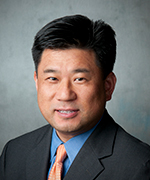Meet the Maestro at Mastercard
Steve Tae talks about his role in global business development for Mastercard and why he chose the MSIT program to help boost his career growth.
Technically speaking, Steve Tae (MSIT ‘00) is vice president of global business development for the Office of Strategic Growth at Mastercard.
But that’s not how he sees himself. Rather, Tae thinks the role he plays at the global financial technology company is more theatrical.
 “I like to describe my role as an orchestra maestro, balancing diverse and complementing sections and players to manage the tempo of the music to ensure my team has a great performance,” Tae said.
“I like to describe my role as an orchestra maestro, balancing diverse and complementing sections and players to manage the tempo of the music to ensure my team has a great performance,” Tae said.
The sections? Those are the different capabilities and global regions he helps drive and serve, respectively.
The players? They are the resources he is able to bring to help address his clients’ needs.
Tempo management? That’s all about directing the pipeline activity flows. Succeeding there leads to a great performance, which Tae said is all about achieving the company’s business objectives.
To find success as he has grown his career, Tae continually relies on the lessons learned as a student in Northwestern Engineering's Master of Science in Information Technology (MSIT) program.
“I got a chance to interact with bright, motivated students who came from diverse working and personal backgrounds,” Tae said. “This allowed me to learn not just the theory of our coursework, but from the case studies and conversations we had in learning the materials.”
Those case studies were plentiful at the time Tae started to consider furthering his education. It was the late 1990s, and rumblings of innovative new technologies coming from Silicon Valley were growing louder.
“Many were anticipating how innovation was about to impact commerce, communication, and society in a way that was likened to the industrial revolution,” he said. “This was the dot-com era, and I wanted to better understand the underlying technologies driving this new wave.”
Northwestern’s reputation and the MSIT program’s position as a top-tier offering caught Tae’s attention. The program’s weekend-only option allowed him to go to school to accelerate his career growth while remaining in his full-time job.
He said he found tremendous value in connecting with other students with similar passions and interests, which helped him create a robust network to lean on after his graduation.
One of the passions that emerged for Tae was working in the nexus of public-private partnerships and helping those typically on the fringes of society in their pursuit of greater success. It’s a passion he is able to pursue at Mastercard, where he's worked since 2015.
Tae started as vice president for customer analytics for the North American region, then advanced to focus on a global role leading business development for all payment flows for cities before transitioning to his current role.
“For the past four years, I worked with diverse population segments across the local government landscape, including those who come from vulnerable and marginalized communities,” he said. “The unbanked and underbanked groups can extend to those who are unhoused, undocumented, from youth to the elderly. The strength of a city can only be discussed when the least of these have financial tools and infrastructure to guide their pathways to economic prosperity.
"Now, my attention is focused on driving financial and digital inclusion through partnerships with our international multilateral development banks, and scaling this at broader country-levels.”
Tae said his goal is to be a great maestro for the orchestra he conducts. That means casting a vision for his teams, rolling up his sleeves to get into the details where needed, being laser-focused on his clients’ needs, and holding a risk-taking mindset.
“I’m all about casting a wide net to test where our assets have stickiness with our global clients, but I also have the mindset to be willing to fail,” he said. “When we take on calculated opportunities where there’s uncertainty, they tend to be where we often learn the most because it is often when we continue to stretch ourselves mentally and professionally. These learnings add to our career path.”

